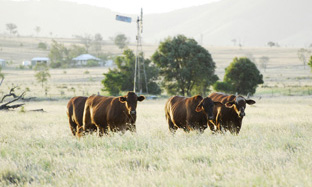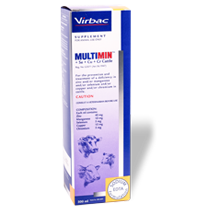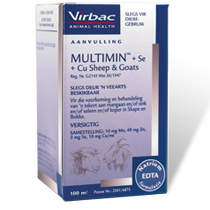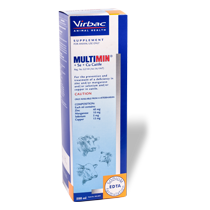.jpg)
Is a 'Hidden Hunger' for Copper Robbing Your Farm?
On any farm, you want your cattle and sheep to be doing more than just getting by - you want them to be thriving. A big part of that comes down to tiny but powerful minerals, and one of the most important is copper.
Not having enough copper, or copper deficiency, is a huge problem for grazing animals all over the world, short on the heels of selenium. You might not see dramatic signs like animals suddenly dying. Instead, copper deficiency is often a "hidden hunger". It quietly steals your profits by causing poor growth, trouble with breeding, and a weak immune system across your entire herd or flock. It’s a silent problem that can cost you dearly.
Why Copper is Such a Big Deal
Think of copper as a master key that unlocks your animals' potential. It’s a vital part of the enzymes that run their bodies, and without it, things start to break down.
- Energy and Growth: Copper is the spark plug for your animal's engine. It helps create the main fuel, called ATP, that every single cell needs to function. Without enough copper, the engine sputters. This leads to poor growth, less milk, and animals that just don't do well.
- A Strong Immune System: Copper is like a bodyguard for the immune system. It helps protect immune cells while they fight off bugs and germs. Animals low on copper get sick more easily, don't respond as well to vaccines, and struggle more with parasites. It's even been shown that copper helps immune cells grab and destroy bacteria.
Source: Image generated by Gemini Pro
- Fertility is Money: Nothing hits the wallet harder than poor fertility. Copper is essential for making the hormones that drive reproduction. A shortage is directly linked to anoestrus, cows not conceiving, early embryo losses, and more retained placentas. Studies show that supplementing copper can boost pregnancy rates and get cows/ewes pregnant quicker.
- Gut health: Copper helps to strengthen the intestinal wall, and thus ensures a faster and more effective recovery after digestive tract illnesses such as diarrhea.
- Strong Bones and Bodies: Copper is the "glue" that helps link together collagen and elastin, which give strength to bones, joints, and even blood vessels. A deficiency can lead to lameness, and in serious cases, broken bones or even sudden death from a ruptured aorta, known as "falling disease".
- A trial conducted in 1980 studied the effect of a copper deficiency in sheep. The control group received no MULTIMIN whereas the other group received MULTIMIN. A clear difference can be seen in the bone density of these sheep:
The Copper Thieves: Why Your Animals Are Running Low
Even if you think you have a good mineral plan, your animals might still be short on copper. This usually isn't because the grass has zero copper (though that can happen). More often, it's because other things in their food and water act like bullies that steal the copper before the animal can use it.
The biggest culprits are:
Molybdenum and Sulphur. When an animal eats feed or drinks water high in these two elements, they team up in the rumen and form compounds that grab onto copper like a pair of handcuffs. This locks up the copper, making it useless to the animal, so it just passes out in the manure. In South Africa, sulphur from coal power stations can contaminate pasture and water, making this problem even worse.
A study conducted by Arthington in 2023, clearly shows low (deficient) levels of copper and selenium in the livers of animals grazing near these power stations:
Liver analysis shows significantly lower selenium and copper in (impacted) cattle grazing near power stations.
Iron is another common bully. Many pastures and water sources in South Africa are high in iron, which can also tie up copper and prevent it from being absorbed.
When They Need Copper Most
An animal’s need for copper isn't always the same. It shoots up during stressful, "critical windows" of production.
- Pregnancy: In the last few months before giving birth, a cow or ewe transfers a huge amount of her own copper to the fetus to build up its liver stores. This is because milk is actually very low in copper, so the calf or lamb is born relying completely on the supply it got from its mother before birth.
- Breeding: This is such a sensitive period when embryo losses can occur - copper protects against embryo losses and ensures more viable egg cells. In bulls and rams, copper helps to protect the sperm cells - do not let a copper deficiency lead to the unnecessary rejection of your bulls or rams.
- Stressful Events: Things like calving, weaning, and transport are major stressors. Stress not only makes animals eat less (so they take in less copper), but the stress hormones themselves make it harder for the gut to absorb the copper they do eat. This means their copper levels can crash right when their immune system needs it the most.
Research has shown major losses in copper and zinc following a disease challenge and a 266% reduction in copper retention in the body following a stressful event.
Copper and zinc urinary losses following an infectious bovine rhinotracheitis virus challenge (Orr et al., 1990)
A Smarter Way to Manage Copper
Relying only on traditional licks and blocks can be a gamble. The form of copper used in them is often cheap (eg. copper sulphate) and not easily absorbed by the animal. Plus, you never know who is using the lick - some animals take too much, while others, often the ones who need it most, get none at all.
So, what's the solution? A two-pronged attack is best.
- Build a Strong Foundation: Provide a good quality, year-round oral mineral that your animals can actually absorb. This keeps their baseline levels topped up.
- Strategic Top-Up: During those "critical windows" of high demand and stress, use a tool like MULTIMIN, an injectable trace mineral at a scientifically proven copper concentration of 15 mg/ml. An injection is like a direct deposit - it completely bypasses the copper thieves in the rumen and gets to work immediately. The minerals peak in the blood within hours, giving your animals a powerful boost right when they need it most to support fertility and immunity.
By understanding the hidden threat of copper deficiency and using a smart, two-step approach, you can stop this silent thief from robbing your profits and help your animals perform their best.
Please take note of the following: Sheep are highly susceptible to copper toxicity and should not be supplemented with copper unless there is an established diagnosis of copper deficiency.




